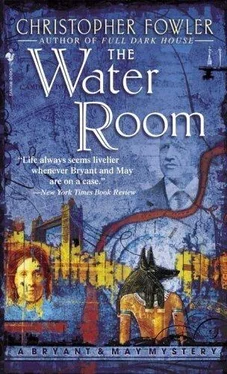Christopher Fowler - The Water Room
Здесь есть возможность читать онлайн «Christopher Fowler - The Water Room» весь текст электронной книги совершенно бесплатно (целиком полную версию без сокращений). В некоторых случаях можно слушать аудио, скачать через торрент в формате fb2 и присутствует краткое содержание. Год выпуска: 2006, Жанр: Детектив, на английском языке. Описание произведения, (предисловие) а так же отзывы посетителей доступны на портале библиотеки ЛибКат.
- Название:The Water Room
- Автор:
- Жанр:
- Год:2006
- ISBN:нет данных
- Рейтинг книги:5 / 5. Голосов: 1
-
Избранное:Добавить в избранное
- Отзывы:
-
Ваша оценка:
- 100
- 1
- 2
- 3
- 4
- 5
The Water Room: краткое содержание, описание и аннотация
Предлагаем к чтению аннотацию, описание, краткое содержание или предисловие (зависит от того, что написал сам автор книги «The Water Room»). Если вы не нашли необходимую информацию о книге — напишите в комментариях, мы постараемся отыскать её.
The Water Room — читать онлайн бесплатно полную книгу (весь текст) целиком
Ниже представлен текст книги, разбитый по страницам. Система сохранения места последней прочитанной страницы, позволяет с удобством читать онлайн бесплатно книгу «The Water Room», без необходимости каждый раз заново искать на чём Вы остановились. Поставьте закладку, и сможете в любой момент перейти на страницу, на которой закончили чтение.
Интервал:
Закладка:
‘What is it?’ asked Bryant impatiently.
‘Some kind of shrine. There are statues everywhere-all the same figure, but all different sizes. I wish you’d come up.’
‘I wouldn’t get back down.’
‘You’d make more of this than me. I recognize the image.’
‘Can you show me one?’
‘Here.’ May reappeared in the hole, smothered in chalk dust. He shifted the torchbeam on a foot-high plaster figure, broken at the neck. In his other hand he held the head of a jackal.
‘Well, that’s Anubis,’ said Bryant. ‘Ancient Egyptian god of the underworld, protector of the dead and the embalmers, guardian of the necropolis.’
‘There must be thirty or forty identical statues up here. They’re all broken, every single one of them.’
‘Let me see that one in your hand.’
May passed it down to his partner.
Bryant ran a finger across the figure’s snout and around its long pointed ears. ‘It’s a cheap replica of a genuine artefact,’ he sniffed dismissively. ‘The paintwork is far too vivid. Very few of the real article still have this kind of dense black colouring. What a pity. And they’re all broken? It’s easy to find replicas in one piece. How odd.’ He handed it back. ‘The Egyptians gave their god the head of a jackal because so many of the animals wandered about their graveyards. Priests would wear jackal masks during the mummification process. He’s inspired all kinds of worshippers. Perhaps our Mr Ubeda belongs to some kind of a cult.’
‘This is giving me the creeps,’ said May. ‘I don’t like dealing with obsessives, they’re unpredictable and dangerous. These things are on the floor, on shelves, everywhere. There are some on the walls, too, painted on papyruses. There’s even what looks like a mummified dog up here. Its head is severed from its body as well. What’s the point of collecting this sort of stuff if it’s damaged and worthless?’
Bryant had walked back into the office, and was trying the cupboard doors. ‘I think we’d better go before he returns,’ he called.
‘Why?’ asked May. ‘Is there a problem?’
‘Let’s just say I agree with you about obsessives.’ Bryant was looking at the gun on the cupboard shelf.
19. FEET OF CLAY
It had taken Elliot Copeland all day to get the front yard of the builders’ merchant broken up and loaded on to his truck. Beneath the concrete slabs, the earth was as wet and heavy as a Christmas pudding. He had found fragments of horse bone buried deep in the brown London clay, remnants from the time when the Green Street Races were held in Kentish Town. Dozens of delicately curved white pipes poked out of the mud like bird ribs; each lay discarded where it had been smoked. The soil held more secrets than anyone could know. The roads traced the jigsaw patterns of ancient settlements, following their hedgerows and tributaries, titled after their landlords and hunting grounds, their mistresses and battles. Nothing was as arbitrary as it appeared. Even the public houses were still imprisoned by their nomenclature, despite numerous name-changes and makeovers.
His arms and back ached. He badly needed another drink, but had finished the quart of scotch he kept in the cab. At least the men in the builders’ machine shop were decent local types, not like the street’s new arrivals, who were incapable of painting a wall without calling for help. Somewhere along the line he had got the reputation of being cheap, and now it had proven impossible to raise his prices without them all complaining. He could have done with a work-mate today, but couldn’t afford to pay one. Was this, he wondered, what his life had boiled down to? He’d left art college with big ideas, but unfortunately so had everyone else. After the time of the Hornsey riots, everyone had wanted to be a rebellious art student, but what all that rebellion and popularity meant was that there were no jobs at the other end.
He was forty-six, the divorced father of a child he was no longer allowed to visit, because his inarticulate anger arose in drunkenness. And all people saw when they looked at him was an overweight loser with a screwdriver and a paintbrush. He had thought this was all life could offer now, loss and disappointment-but you never knew what fate held in store, and a short while ago he had been given his chance. The trick was knowing when to act upon his knowledge-but soon, he was sure, people would look at him with new-found respect. He shouldn’t have talked to Jake Avery at the party, though. It didn’t pay for too many people to be involved. The drink always made him gabby. He backed the truck up to the muddy pit and clambered down from the cab, thinking about what to do.
Before he went to the police, he would have some fun with the yuppie scum. He was the longest-remaining resident in the street, had lived here when kids still played in the road and mothers sat in deckchairs on their front steps, when there had still been a corner pub and a shellfish stall, long before all the estate-agent boards had appeared and the dry-as-dust middle-class couples had transformed the street’s loud, crowded family rooms into havens of hushed elegance. Now the road was lined with pristine cars and the houses were inhabited by invisible people who came home late and sat in their gardens drinking wine in the summer, hankering for a kind of village life that only existed in their collective imagination, because community spirit, the real spirit of the streets, meant brawling and shouting and getting your hands dirty.
He’d been invited to their party out of politeness; no one had intended him to take the invitation seriously and actually turn up. But he had a secret that would surprise them all, and perhaps it was time to do something with it.
Kallie closed the windows in the front bedroom because the rain was soaking the carpet. It seemed impossible to keep water out of the house. She could hardly believe that Paul had gone. The drawers in his side of the flimsy flatpack wardrobe were empty. This morning at dawn he had thrown some pants and Tshirts into a brand-new nylon backpack, and had taken off. It did not matter who he had slept with in Manchester, only that he had done it at all. The thought allowed her to release him. If he was ever to go, let it be now.
He had tried to write her a note; she found several unfinished attempts in the kitchen bin. It struck her as odd that in order for a man to find himself, he first had to shake off the attentions of those who truly cared for him. She sat on the bed and listened to the rain in the gullies, wondering whether she had smothered too much, pushing him too quickly into setting up house. He had craved spontaneity and she had acted accordingly, but apparently it had been the wrong type of spontaneity.
She shopped and bought a paper, leaving the dripping umbrella to form a puddle on the bare boards in the hall. She painted a dresser pale-blue, and attempted to strip some of the maroon lincrusta wallpaper in the lounge, but cut her hand on the scraper. Finally, she went to see Heather.
Kallie had not been looking for a shoulder to cry on. Compassion ill-suited her neighbour. Heather was far too self-interested to express concern for anyone else’s misfortune. However, when she opened the door, she was an alarming sight. Heather was seething with misplaced energy; Kallie could almost see sparks arcing in aberrant neural connections. What’s wrong with her? she thought. Is she ill? She had expected to be faced with Heather’s patented brand of nervy bravado. Instead she found a borderline hysteric, as distracted as any Ophelia. Heather had flung back the door and walked away into the kitchen, where she paced beside the counter.
‘He’s planning to divorce me,’ she explained, ‘taking everything and giving it all to her. What is it about Paris that makes middle-aged men do this?’
Читать дальшеИнтервал:
Закладка:
Похожие книги на «The Water Room»
Представляем Вашему вниманию похожие книги на «The Water Room» списком для выбора. Мы отобрали схожую по названию и смыслу литературу в надежде предоставить читателям больше вариантов отыскать новые, интересные, ещё непрочитанные произведения.
Обсуждение, отзывы о книге «The Water Room» и просто собственные мнения читателей. Оставьте ваши комментарии, напишите, что Вы думаете о произведении, его смысле или главных героях. Укажите что конкретно понравилось, а что нет, и почему Вы так считаете.












